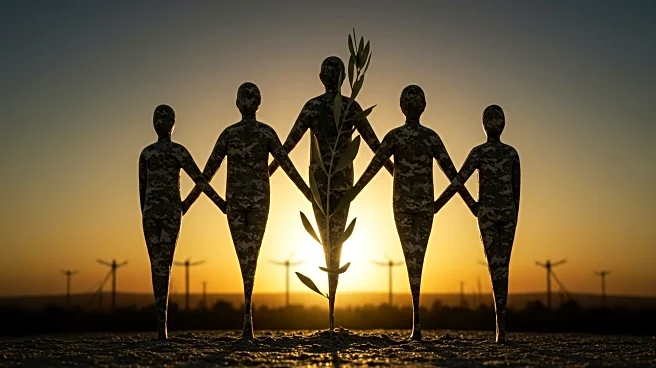What's Happening?
Shlomit, a 48-year-old nurse from Rehelim, has joined her husband and two sons on the front lines in Gaza as part of the IDF's 401st Armored Brigade. Her decision to enlist was driven by a desire to contribute to the war effort, especially after her son Y. was involved in a clash with terrorists that resulted in casualties. Despite never having served in the military, Shlomit enlisted through a special track for women with relevant professional training. She now serves in the brigade's medical corps, providing life-saving treatments and evacuating wounded soldiers. Her family, including her husband and sons, have been actively involved in reserve duty since the outbreak of the war nearly two years ago.
Why It's Important?
Shlomit's involvement highlights the personal sacrifices and commitments made by families in conflict zones. Her story underscores the broader societal impact of military service in Israel, where families often face extended periods of separation and risk. The participation of women like Shlomit in military roles traditionally dominated by men reflects changing dynamics in gender roles within the armed forces. Her service also emphasizes the importance of medical support in combat situations, showcasing the critical role of healthcare professionals in military operations.
What's Next?
Shlomit continues to split her time between her duties in the IDF and her work as a nurse at Meir Medical Center. Her ongoing service in Gaza, alongside her family, is likely to persist as long as the conflict requires. The broader implications for military families in Israel include potential policy discussions on support systems for reservists and their families, as well as the integration of women in combat roles. The situation in Gaza remains fluid, with military operations continuing to evolve.
Beyond the Headlines
Shlomit's story raises questions about the psychological and emotional toll on families involved in prolonged military conflicts. The integration of women in combat roles may lead to discussions on gender equality and the challenges faced by women in traditionally male-dominated fields. Additionally, the narrative of family involvement in military service may influence public perceptions of the IDF and its operations in Gaza.










